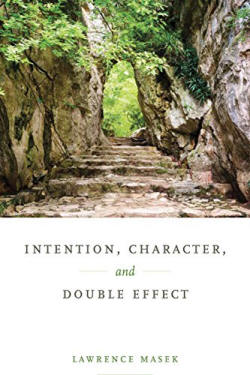Catholic Medical Quarterly Volume 69(3) August 2019
Book Review
Intention, Character and Double Effect
by Lawrence Masek University of Notre Dame Press
Reviewed by Dr Pravin Thevathasan
 There
is much to like in this work. Masek puts forward an agent-centred account
of double effect reasoning. Intention really matters. When I intend evil,
I commit evil, thereby corrupting my character. When I intend an act that
is not evil in itself even though it has evil side-effects, I do not do
evil. It goes without saying that the double effect rule needs to be
followed, and this is discussed in detail. What is of great interest is
the discussion of intention and double effect as understood by some of the
great philosophers of our age, including Philippa Foot and Elizabeth
Anscombe.
There
is much to like in this work. Masek puts forward an agent-centred account
of double effect reasoning. Intention really matters. When I intend evil,
I commit evil, thereby corrupting my character. When I intend an act that
is not evil in itself even though it has evil side-effects, I do not do
evil. It goes without saying that the double effect rule needs to be
followed, and this is discussed in detail. What is of great interest is
the discussion of intention and double effect as understood by some of the
great philosophers of our age, including Philippa Foot and Elizabeth
Anscombe.
Masek is against abortion in most cases. However, he believes it is justified in cases of craniotomy, salpingotomy and in the Phoenix abortion case. He believes that these are cases of indirect abortion. I do not. In the Phoenix abortion case, a 27 year old pregnant woman developed serious complications caused by pulmonary hypertension. This led to the abortion of a 11 week old foetus. The nun who agreed to the procedure was excommunicated. While information regarding this case is scarce, I have no doubt that a direct abortion was carried out. Double effect reasoning does not apply because the doctor intended to terminate the life of a foetus by means of dilation and curettage.
I have no doubt that Masek as well as the new natural law theorists are pro-life in almost all cases. Unfortunately, they appear to use double effect reasoning to justify acts where evil is intended. In turn, this suggests a suspect understanding of the principles of double effect. Clinicians are best advised to follow the traditional teachings on the matter as proposed in the Catholic tradition. That said, I recommend this work for its nuanced discussion of a complex and important subject in medical ethics.
